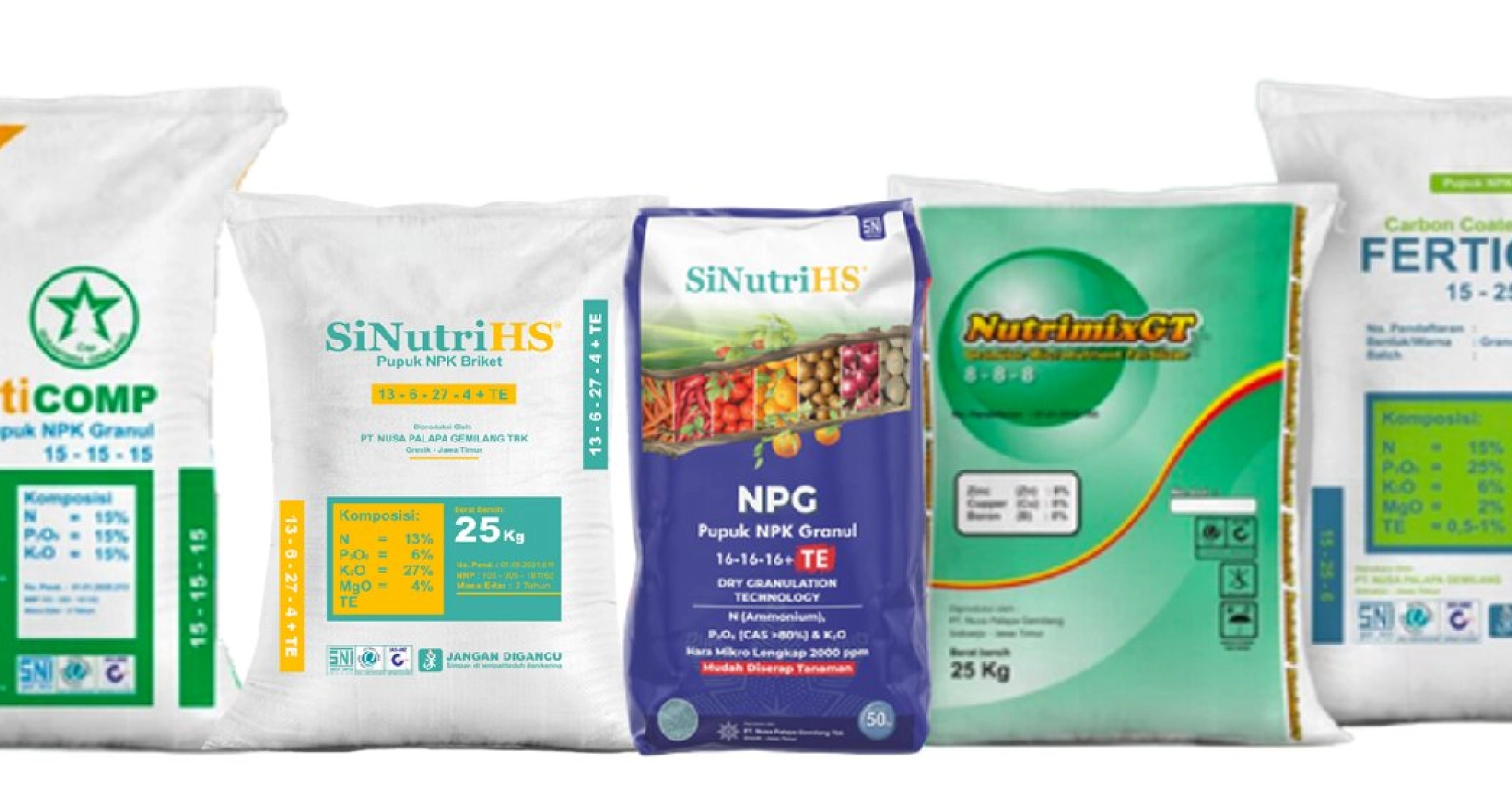
Pupuk NPK: Nutritional Solutions for Productive and Sustainable Oil Palm
In modern agriculture, fertilizer plays a vital role. Without adequate nutrient intake, plants cannot grow optimally. Yields will decrease drastically, product quality will decrease, and land efficiency will be compromised. Fertilizers are a solution to meet the nutrient needs of plants during their growth period. Therefore, proper fertilizer use is not only about increasing productivity, but also part of the effort to create a sustainable agricultural system.
Generally, fertilizers can be divided into single fertilizers and compound fertilizers. Single fertilizers contain only one main nutrient, such as nitrogen, phosphorus, or potassium, which serves to correct specific deficiencies in the soil. Meanwhile, compound fertilizers, such as NPK fertilizers, contain a combination of these three main elements in one product, making them a more practical and efficient solution for farmers. NPK fertilizers are available in various formulations to suit plant needs and soil conditions, such as 15-15-15, 13-6-27, and others.
Specifically for oil palm plantations, NPK fertilizer plays a strategic role in boosting long-term productivity. Oil palm plants require the right balance of nutrients to achieve optimal growth. The nitrogen in NPK fertilizer helps accelerate the formation of productive crowns and leaves. Phosphorus supports strong root development and flower formation, while potassium plays a role in increasing fruit formation, oil yield, and plant resistance to environmental stress and disease. With proper fertilization, oil palm plantations not only produce more and heavier fresh fruit bunches (FFB), but also have a longer productive period, thus providing greater economic benefits for farmers.
Beyond simply increasing yields, NPK fertilizer also contributes to national energy security. Palm oil is the primary raw material for biodiesel production, which is now a crucial part of Indonesia's green energy transition, including the B40 program (a 40% biodiesel blend in diesel). Maintaining oil palm productivity will ensure a supply of renewable energy feedstock and help reduce dependence on fossil fuels. In this context, NPK fertilizer not only impacts the agricultural sector but is also a crucial component of the national energy security strategy.
Furthermore, although oil palm is not directly a food crop, its processed products—especially palm oil—are a vital part of the national food chain. Palm oil is widely used as a base ingredient in cooking oil, margarine, and various other food products. The palm oil industry also contributes significantly to the national economy by creating jobs, increasing farmers' incomes, and strengthening people's purchasing power. Even palm oil waste such as empty fruit bunches, boiler ash, and shells can be reused as organic fertilizer and soil amendments, supporting the concept of circular and environmentally friendly agriculture.
As an NPK fertilizer producer committed to national agricultural development, PT Nusa Palapa Gemilang Tbk (NPG) offers fertilizer solutions that are not only high-quality but also tailored to the specific needs of Indonesian tropical agriculture. Through flagship products such as NPG SinutriHS and Ferticomp fertilizers, NPG provides proven formulations that can increase crop yields and cultivation efficiency, especially for strategic crops like oil palm.
SinutriHS and Ferticomp offer complete solutions that combine macro and micro nutrients, suitable for various plant types and soil conditions. Supported by field research and a continuously updated scientific approach, all NPG products are developed to adapt to climate dynamics and current agricultural needs.
More than just a product provider, NPG actively assists farmers and business owners through fertilizer education and technical consultations. This approach makes fertilization more precise, cost-effective, and sustainable. Our commitment is to support national food and energy security through appropriate fertilization—building a fertile, independent, and green Indonesian agriculture.
Generally, fertilizers can be divided into single fertilizers and compound fertilizers. Single fertilizers contain only one main nutrient, such as nitrogen, phosphorus, or potassium, which serves to correct specific deficiencies in the soil. Meanwhile, compound fertilizers, such as NPK fertilizers, contain a combination of these three main elements in one product, making them a more practical and efficient solution for farmers. NPK fertilizers are available in various formulations to suit plant needs and soil conditions, such as 15-15-15, 13-6-27, and others.
Specifically for oil palm plantations, NPK fertilizer plays a strategic role in boosting long-term productivity. Oil palm plants require the right balance of nutrients to achieve optimal growth. The nitrogen in NPK fertilizer helps accelerate the formation of productive crowns and leaves. Phosphorus supports strong root development and flower formation, while potassium plays a role in increasing fruit formation, oil yield, and plant resistance to environmental stress and disease. With proper fertilization, oil palm plantations not only produce more and heavier fresh fruit bunches (FFB), but also have a longer productive period, thus providing greater economic benefits for farmers.
Beyond simply increasing yields, NPK fertilizer also contributes to national energy security. Palm oil is the primary raw material for biodiesel production, which is now a crucial part of Indonesia's green energy transition, including the B40 program (a 40% biodiesel blend in diesel). Maintaining oil palm productivity will ensure a supply of renewable energy feedstock and help reduce dependence on fossil fuels. In this context, NPK fertilizer not only impacts the agricultural sector but is also a crucial component of the national energy security strategy.
Furthermore, although oil palm is not directly a food crop, its processed products—especially palm oil—are a vital part of the national food chain. Palm oil is widely used as a base ingredient in cooking oil, margarine, and various other food products. The palm oil industry also contributes significantly to the national economy by creating jobs, increasing farmers' incomes, and strengthening people's purchasing power. Even palm oil waste such as empty fruit bunches, boiler ash, and shells can be reused as organic fertilizer and soil amendments, supporting the concept of circular and environmentally friendly agriculture.
As an NPK fertilizer producer committed to national agricultural development, PT Nusa Palapa Gemilang Tbk (NPG) offers fertilizer solutions that are not only high-quality but also tailored to the specific needs of Indonesian tropical agriculture. Through flagship products such as NPG SinutriHS and Ferticomp fertilizers, NPG provides proven formulations that can increase crop yields and cultivation efficiency, especially for strategic crops like oil palm.
SinutriHS and Ferticomp offer complete solutions that combine macro and micro nutrients, suitable for various plant types and soil conditions. Supported by field research and a continuously updated scientific approach, all NPG products are developed to adapt to climate dynamics and current agricultural needs.
More than just a product provider, NPG actively assists farmers and business owners through fertilizer education and technical consultations. This approach makes fertilization more precise, cost-effective, and sustainable. Our commitment is to support national food and energy security through appropriate fertilization—building a fertile, independent, and green Indonesian agriculture.









